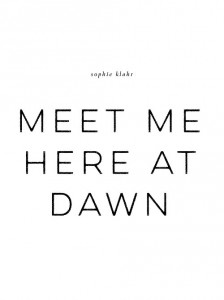Book Review
 There is often, in poetry, a false sense of purity in witness, especially witness in lyric. The poet at work in a vacuum. The poet as peripheral, spectator, omniscient. Not so in Sophie Klahr’s Meet Me Here at Dawn. “One Slaughter” is the book’s fourth poem. The last two (of three) stanzas read:
There is often, in poetry, a false sense of purity in witness, especially witness in lyric. The poet at work in a vacuum. The poet as peripheral, spectator, omniscient. Not so in Sophie Klahr’s Meet Me Here at Dawn. “One Slaughter” is the book’s fourth poem. The last two (of three) stanzas read:
Pollen sighs shawl-like citywide,
yellow with futures, then overnight
in the cold snap
all the bees go down.
I crouch to watch—
one creeps along the street. I note
who turns to judge my grief.
Lulled by regular meter and sound, the reader here does not anticipate the moment the speaker and poet “note” the reader. It is a connection both chilling and intimate, when the speaker of these poems acknowledges being watched—as if to say, “I know you’re still here.” In this final tercet, we see the speaker and poet at work. Meet Me Here at Dawn is a book of scrutiny and of elegy, where the speaker is a conspicuous witness and demands the same level of self-awareness from the reader.
Klahr moves with grace through topics of infidelity, age, pregnancy, and loss—but it is an uncommon grace of grim determination. I came to this book immediately after the presidential election, during a time when I was, for comfort, rereading only what I had already near-memorized. When I finally picked up Meet Me Here at Dawn, I was taken by the brute strength of these poems. In a time when language itself is under increased attack, when telling the truth is jarring and unexpected, this is the poetry we need. The poems are unflinching in their discourse and leave no room for readers to avert their eyes. The poem “Such Unfortunates” begins, “It doesn’t get better, it gets different . . . This too / shall pass . . . this night where women droop into the room like low fog . . . Each holds a tiny body over her world and I wonder / which of us will die first.” Klahr places the speaker not in extreme scenes or landscapes, but in the everyday, with an intense, untiring awareness. At the end of “Such Unfortunates,” the speaker “murmur[s] sobriety’s aphorisms . . . until something pulls taut between us, splits— you say, / I want you to beg for it on all fours, and I say, I am.”
What I am most drawn to in Klahr’s poetry is an extraordinary depth of perspective and the careful balance between self-awareness and self-consciousness. For all this collection tackles, the poet never once takes her eye off the reader. I am reminded of a production of Margaret Edson’s Wit that I saw at First Church Boston in Boston’s Back Bay late last year with Liz Adams playing the lead role of Vivian Bearing, PhD. I had arrived a bit late and took one of the remaining seats in the front row, about ten feet from the hospital bed in which much of the play takes place. Adams gave a tremendous performance, and, in her many soliloquies through the fourth wall, always seemed to keep at least one eye on me. The small stage and Adams’s enormous performance simply did not allow for distraction or escape. Klahr manages to create this same atmosphere in the collection and transfixes her readers by frequently and deftly acknowledging them. Take this section from “Lesson”:
In class, I draw a man dragging another man
on a leash . . .
I ask my students what they feel, seeing this—
they search my face for the right answer.
Multiple choice: Pity?
Guilt? Nothing?
I let the camera zoom out, draw,
around the men, a stage—
grand curtains framing
the scene, an audience in silhouette.
I ask, Is this different?
This inquiry is central to the collection: Klahr’s investigation into the spectator, the scene, the voyeur, and the object. “Is this different?” The speaker in these poems storms through the spaces of this book like an actor on a small, thrust stage, surrounded by an audience of incredible intimacy. The last poem in the collection, “Kairos,” is one of the most striking in its subtlety. The final section reads:
We sit watching fires the dusk
beach dwellers have set—
dusk at the same shore
where we first met.
I am only allowed beauty like this once, I’d thought
Even at dusk,
something about the light
cast over the ocean is blinding,
a right-warm blinding . . .
Here at the conclusion of the collection, the poet risks this weight of sentiment which is pared down across the rest of the book. This final moment is acutely aware of impermanence, and these last lines are broken as through a prism into the many layers of happiness and grief, fulfillment and loss, that exist throughout. Klahr moves through the dangerous and exposed process of asking “how to describe the house without burning it down.” Meet Me Here at Dawn is the answer to that question.
About the Reviewer
John Allen Taylor’s poems are published in Booth, RHINO, Nashville Review, Faultline, Zone 3, Muzzle, and other places. He currently lives in Boston, MA and serves as Ploughshares’s senior poetry reader. He grows vegetables and brews kombucha. Say hello @johna_taylor.